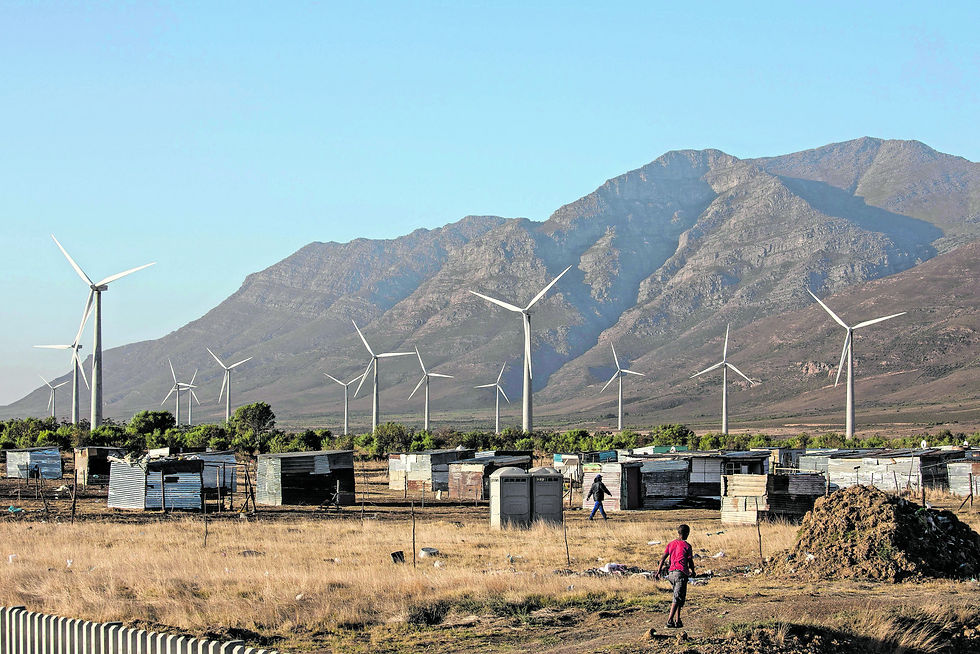In todays blog, we delve into the design thinking process behind community interventions in the renewable energy sector. Our team is passionate about providing readers with insights into our innovative approach and inviting partners to join us in the think tank process. We believe that by co-creating and aligning social investments, we can foster sustainable community development that benefits all stakeholders involved.

In the pursuit of advancing our understanding of large-scale renewable energy policies and their socio-economic implications at the community level, GrowZA has developed an iterative model that speaks to a deeper understanding of social licensing and community agency in this context.
By emphasizing the importance of community engagement and recognizing existing community agency, GrowZA's approach aims to establish clear success factors, map specific benefits to local citizens and communities, and promote a more holistic and sustainable community-oriented development fueled by the transition to renewables.
The Significance of Social Licensing
Social licensing is a crucial factor in the successful implementation of renewable energy projects. It refers to the interactions and terms of transaction between communities and operators. To ensure effective social licensing, GrowZA's model emphasizes the need for clear and transparent communication between all stakeholders involved. This includes fostering an environment of trust, understanding the concerns and expectations of the community, and providing avenues for meaningful participation and negotiation. By actively engaging communities in the decision-making process, social licensing becomes a collaborative effort, allowing for a more inclusive and socially acceptable transition to renewable energy.
Community Agency
Empowering Local Communities: Community agency represents the ability and extent to which communities can engage and influence the negotiated terms of the social license to operate. GrowZA recognizes the importance of empowering local communities to actively participate in shaping the outcomes of renewable energy projects. Through its model, GrowZA works closely with community stakeholders, providing them with the necessary knowledge, resources, and support to effectively engage with project developers and policymakers. This empowers communities to voice their concerns, contribute their ideas, and negotiate for fair and equitable terms that align with their social, economic, and environmental priorities. By fostering community agency, GrowZA ensures that communities have a genuine sense of ownership and control over the development process, leading to more sustainable and mutually beneficial outcomes.
The Asset-Based Community Development (ABCD) Approach
GrowZA's community engagement team employs the Asset-Based Community Development (ABCD) approach as a strategic methodology for development. This approach recognizes that communities possess inherent assets and capabilities that can drive their own development. By shifting the focus from identifying community needs to uncovering community strengths and assets, GrowZA empowers communities to take charge of their own future. Through the ABCD approach, GrowZA facilitates conversations and collaborations that tap into the diverse skills, knowledge, networks, and resources within the community. This ensures that community-led solutions are context-specific, demand-driven, and sustainable in the long run.
The Community Capitals Framework (CCF)
To effectively identify, categorize, and map community assets and capital, GrowZA utilizes the Community Capitals Framework (CCF). The CCF provides a comprehensive lens to understand the various forms of capital that exist within a community. It outlines seven types of capital that contribute to community development: social capital, political capital, cultural capital, human capital, natural capital, financial capital, and built capital.
Social capital refers to the interactions, networks, and trust among individuals and groups within the community. It facilitates cooperation and mutual support, forming the foundation for collaborative efforts in the energy transition.
Political capital represents the community's ability to influence resource distribution, policy-making processes, and power structures. It enables communities to actively participate in decision-making and shape the outcomes of renewable energy projects.
Cultural capital encompasses the multi-layered worldviews, cultural norms, and innovations within a community. It informs how community members perceive and interpret the world, shaping their sense of place, belonging, and identity.
Human capital focuses on the individual characteristics, skills, and knowledge that contribute to community development. By enhancing human capital, communities can build their capacity to participate effectively in the energy transition and contribute to community organizations.
Natural capital comprises the landscape, energy flows, and material resources that generate goods and services. Recognizing and preserving natural capital is essential for achieving sustainable and environmentally responsible renewable energy projects.
Financial capital includes the incomes, savings, credit, and loans that facilitate investment in community assets. It plays a vital role in supporting economic growth, job creation, and community-led initiatives.
Built capital refers to the physical infrastructure and facilities that support community activities, such as transportation networks, utilities, education, and healthcare facilities. Enhancing built capital improves the overall quality of life and facilitates community development.
By utilizing the CCF, GrowZA enables communities to identify their existing assets and determine how they can leverage these resources to generate community capital. This approach fosters sustainable development by harnessing the strengths and resources within the community, creating a solid foundation for social, economic, and environmental progress.
Conclusion: GrowZA's expert approach emphasizes the significance of social licensing and community agency in the renewable energy context.
By promoting transparent communication, trust, and meaningful participation, GrowZA empowers communities to actively engage in decision-making processes and influence the outcomes of renewable energy projects.
Through the ABCD approach and the utilization of the CCF, GrowZA facilitates community-led development that leverages community assets, strengths, and resources. This holistic and inclusive approach ensures that the energy transition benefits local citizens and communities in a sustainable and socially responsible manner.
At GrowZA, we are committed to transparency, collaboration, and sustainability in our community interventions. We have shared our design thinking process with you, providing a glimpse into the methodologies and frameworks we employ. We invite partners and like-minded individuals to join us in our think tank process, working together to co-create and align social investments that lead to the sustainable development of communities. By harnessing the power of collective intelligence and leveraging diverse perspectives, we can achieve transformative change and build resilient communities for generations to come. Join us on this journey and let's make a positive impact together.


_edited.png)
Comments